THIS GUN FOR HIRE (1942)
When an assassin shoots a blackmailer and his beautiful female companion dead, he's paid off in marked bills by his treasonous employer who's working for foreign spies.
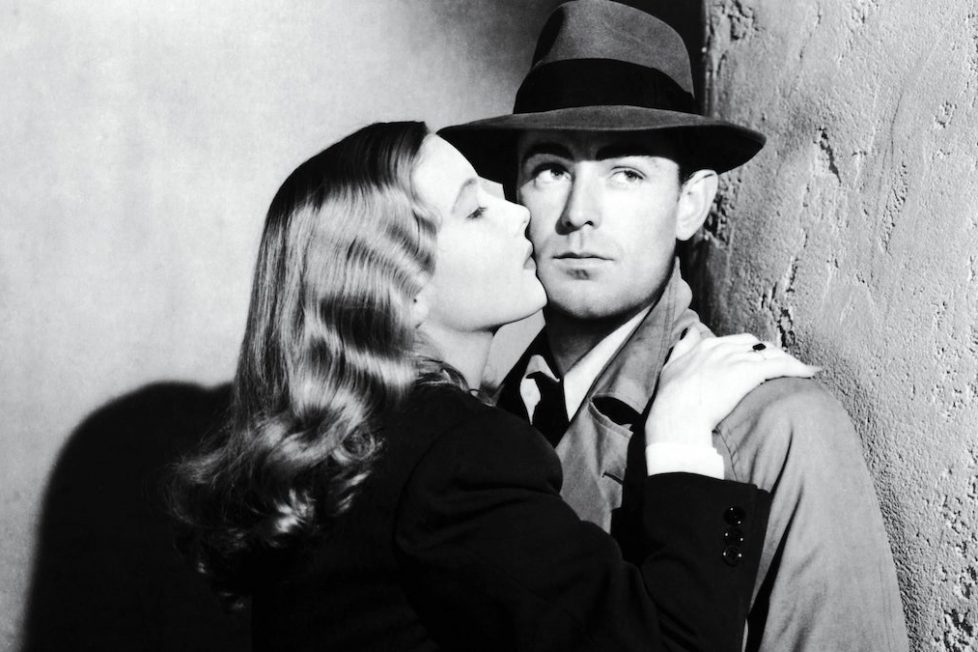
When an assassin shoots a blackmailer and his beautiful female companion dead, he's paid off in marked bills by his treasonous employer who's working for foreign spies.


This Gun for Hire opens post-credits with the handsome, laconic face of Philip Raven (Alan Ladd) waking up in his shabby bedsit. He then feeds a kitten that paws at his window and assaults the cleaning lady when she tries to shoo it. Within 10-minutes he’s committed a contract murder, killed a woman to avoid getting caught, and seriously considered killing a young girl for the same reason.
Welcome to ‘Greeneland’. This Gun for Hire is based on one of Graham Greene’s bloodstained thrillers about death and Catholicism, but one that also indulged his burgeoning penchant for the dirty world of international espionage… so think Brighton Rock (2010) blended with The Quiet America (2002).
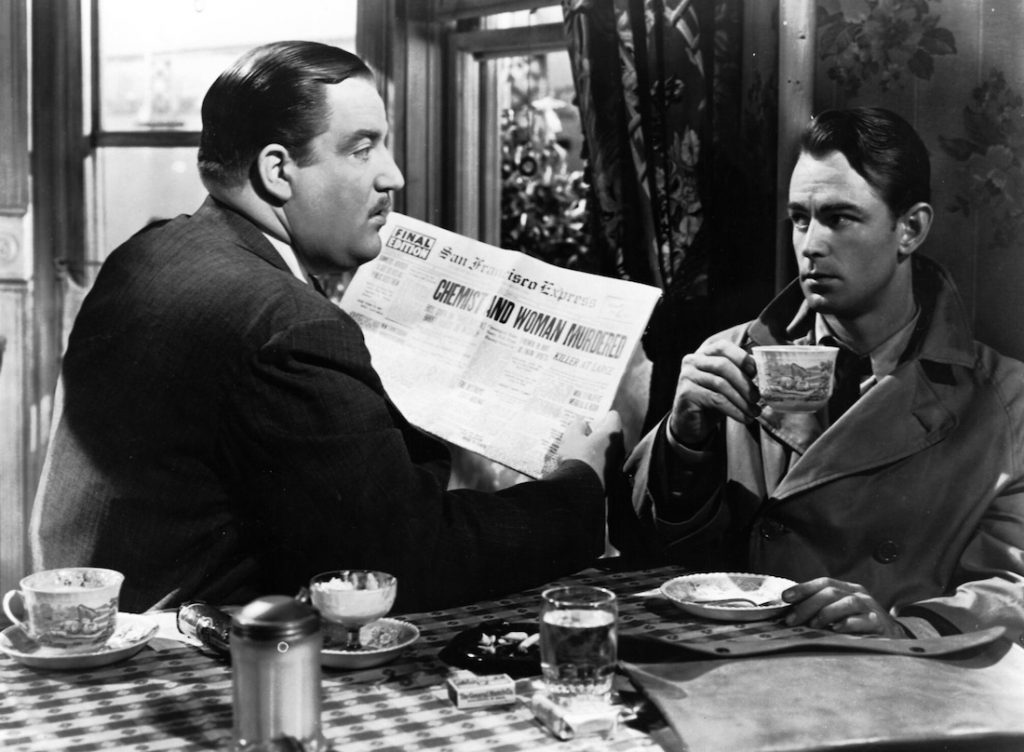
As our “hero”, Raven is about as disreputable as one could reasonably get away with while maintaining audience sympathies. He kills innocent people and animals. He steals unscrupulously. Maybe it’s Ladd’s stoic performance that holds our attention, or maybe not. This film, which “introduces” Alan Ladd in a way that only makes sense if you’re using a different definition of the word “introducing”, gave his career a shot in the arm, leading to The Blue Dahlia (1946) and, of course, Ladd’s most indomitable role in Shane (1953). And yet, Ladd’s giving a terribly wooden and unconvincing performance here. But maybe Ladd’s woodenness is why he holds our sympathies (he was also stiff in Shane, but somehow it worked) because one sees he doesn’t really want to be doing this stuff. He can’t convince us he’s really a cold-blooded killer, despite all the cold-blooded killing he does again and again.
Even the writing by Barry Forshaw (which accompanies this Eureka Blu-ray release) describes the leads as “two performers who are more stars than actors”, which is a charitable way of saying they’re bad actors. The other performer in question is Veronica Lake, in a role whose most memorable moment would go on to be immortalised as that clip playing in the background of Kim Basinger’s house in L.A. Confidential (1997). Lake plays Ellen Graham, a nightclub performer with a singing magic act, who’s recruited by a patriotic senator to go undercover in a club owned by a senior executive of a prominent petrochemical company that might be trying to sell the formula for a poison gas called bromine to the Japanese. No, seriously!
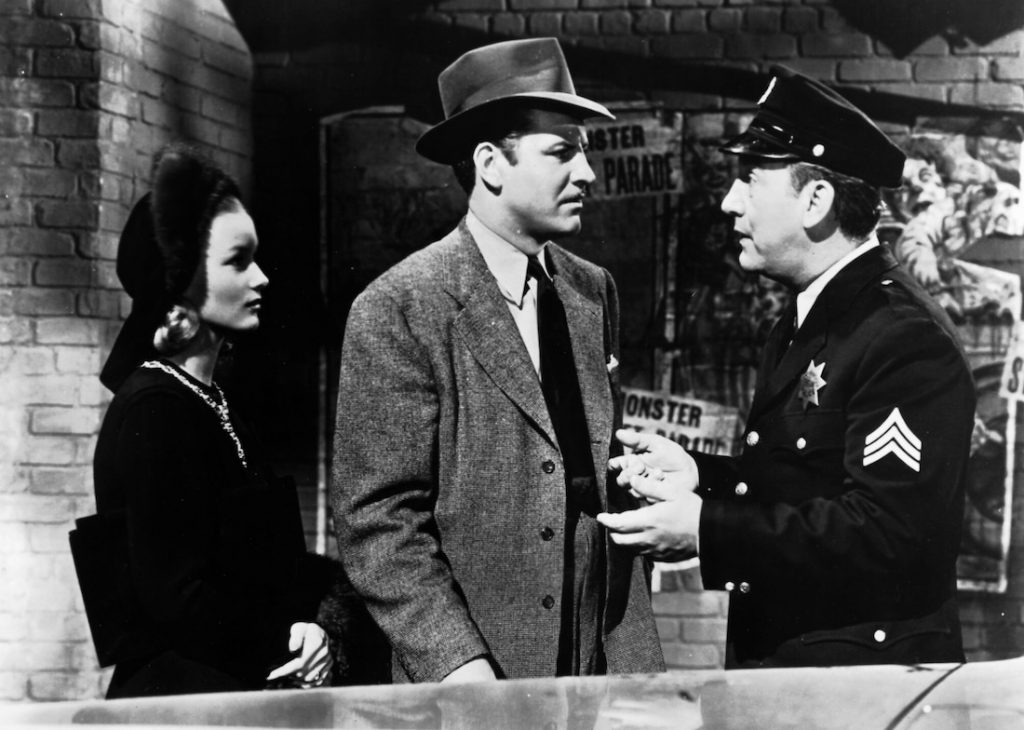
Lake’s character is a strange concoction (a badly written female character, you say, surely not!?) both sultry seductress and a straight-arrow all-American gal who wants to do her bit for her country and then settle down with her cop boyfriend and have lots of babies. She doesn’t actually get to do any undercover work, suspected before she even arrives. Like most female characters, she’s just there to give the men something to yank out of the way of bullets.
The nightclub owner and petrochemical executive in question is Willard Gates (Laird Cregar), a large Englishman in the Sidney Greenstreet mould who exudes absolutely no menace and to modern audiences feels reminiscent of Stephen Fry. But he’s just the middleman—as it’s his boss, Alvin Brewster (Tully Marshall), an impossibly old, wheelchair-bound tycoon in his ivory castle—is the real evil at work here. It’s capitalism gone sour and twisted (one of the screenwriters and the director would fall foul of HUAC after the war). It’s here we get to the good performers in the film, both of them. The first is Tully Marshall as Brewster, an actor born in 1864 who somehow looks even older here. With a hoarse whisper for a voice and a quiet fury that surpasses even Raven’s, he embodies evil in a way that could never earn our sympathies like the young, handsome Ladd.
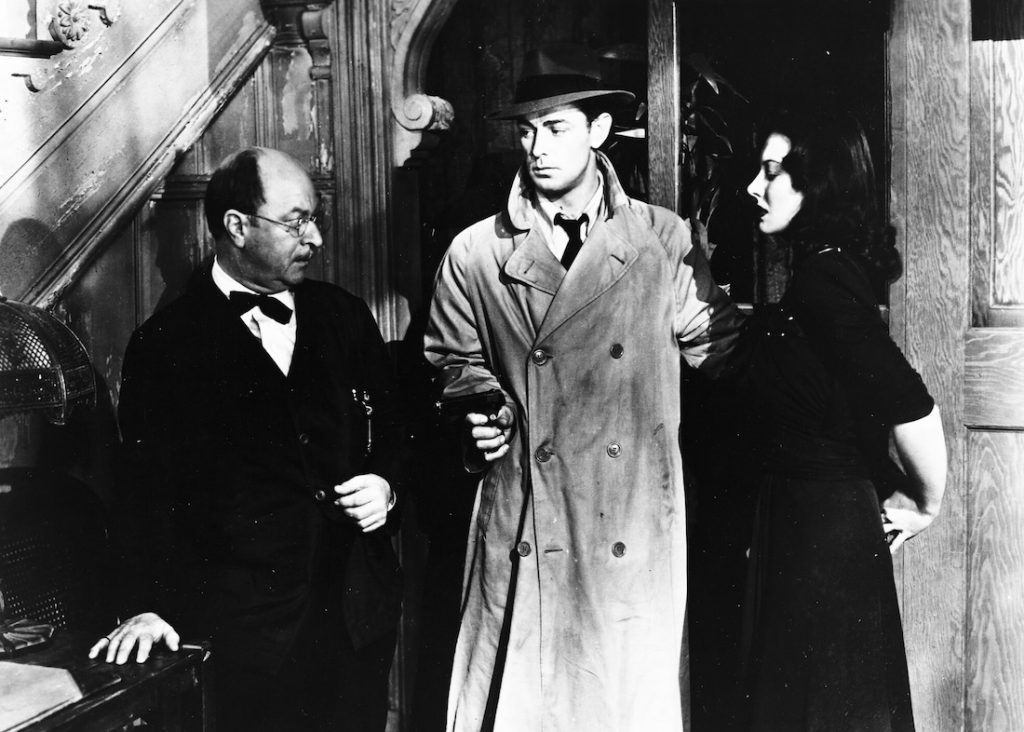
The other great performance is the minor supporting turn of Marc Lawrence as Tommy, Gates’s butler/chauffeur/bodyguard/disposer-of-bodies. Lawrence would go on to have a long career as memorable small-part gangsters in films such as Diamonds are Forever (1971)—“I didn’t know there was a pool down there!”)—The Man with the Golden Gun (1974), and other films that didn’t involve James Bond. He even showed up as a gangster in a fun 1999 episode of Star Trek: Deep Space Nine called “Badda-Bing, Badda-Bang”. Here he brings charisma and pride to the dirtiest of deeds, upset his boss won’t listen to the details of his genius solution to murder Ellen and make it look like an accident.
Sadly, to offset all these quirky and off-kilter elements, This Gun for Hire is laden with a plot both labyrinthine and uninteresting. The characters are where all the interest lies but, as I’ve said, most of them are played unconvincingly. I haven’t even mentioned Robert Preston (who gets second billing) as Ellen’s cop boyfriend, who is coincidentally on Raven’s trail. I’ve forgotten to mention him until now because he’s entirely forgettable. All I can say is that he exists purely to provide complications, although not moral complications, more plot inconveniences.
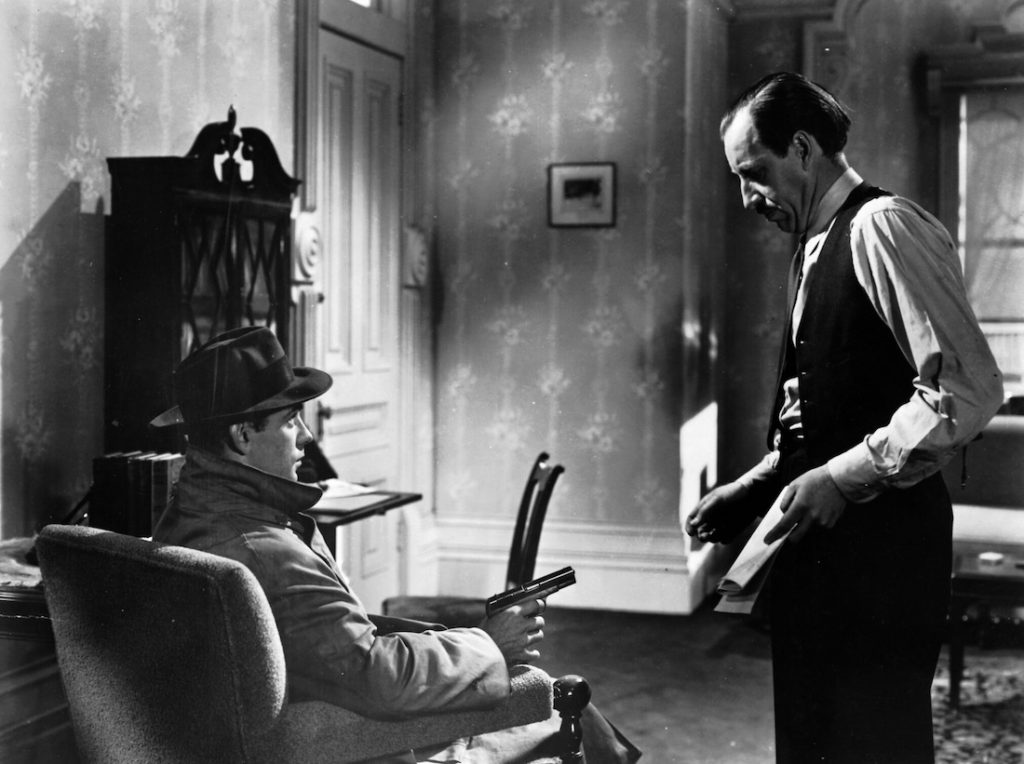
Screenwriters Albert Maltz and W.R. Burnett do their best to make Greene’s novel palatable for US audiences (or should I say passable for American censors?) and they get away with far more than even most film noirs. Raven is genuinely the most morally shady hero I’ve seen in a Hollywood picture from this era, so it’s a shame everyone else lets them down. Whether they’ve grappled with Greene’s plot and lost or decided to feed it through the Raymond Chandler Complicator 2000™, is unclear… but the plot takes the first half of the film for the audience to unravel, and once you have, is unsatisfyingly simple. Sure, there’s kidnap, rescue, gunfights, murders, manhunts, and armed sieges, but they largely elicit yawning.
It’s a double shame then that director Frank Tuttle seems to have done absolutely nothing with the film. He leaves absolutely no creative stamp. Neither do the rest of the (talented, I’m sure) film crew. There are no memorable shots, the music is generic, the production design dull, the costumes uninspired. Perhaps Ladd was simply lucky, he sticks out in the film because his character is the only memorable thing about it. And that’s not even thanks to him, it’s all down to Greene and the screenwriters’ interpretation of his work.
There’s little to recommend This Gun for Hire, but this subpar film contains at its core one of the nastiest, unlikeable-yet-personable heroes of the genre. For many noir fans that may be reason enough to add this edition to their collection.
USA | 1942 | 81 MINUTES | 1.37:1 | BLACK & WHITE | ENGLISH

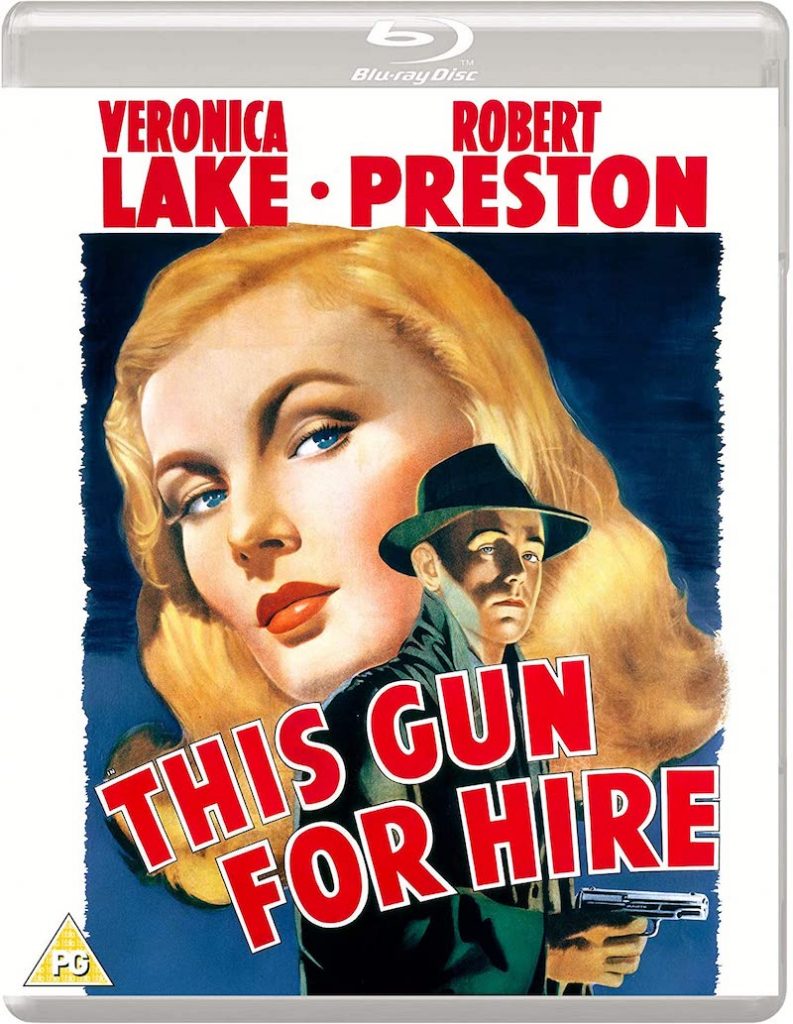

director: Frank Tuttle.
writers: Albert Maltz & W.R Burnett (based on the novel ‘A Gun for Sale’ by Grahame Greene).
starring: Veronica Lake, Robert Preston, Laird Cregar & Alan Ladd.
